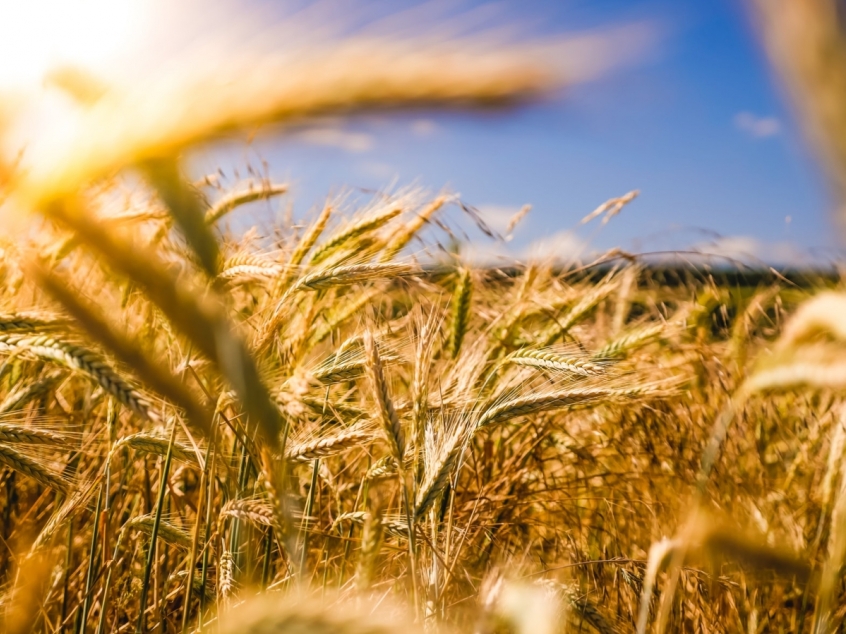
One of the new American participants to the Broughton Park Jewish Christian Dialogue Group which I chair has, unusually, been appointed 'Rabbi in Residence' in her local Episcopalian Diocese, with her views being sought on a number of issues as an equal.
Rabbi Raachel's husband, Dr Stephen Jurovics, is a scientist with a PhD in Engineering from the University of Southern California. He has been working on climate change mitigation as part of his engineering work for more than two decades and has published about 20 technical papers on the subject, as well as given numerous presentations at professional conferences.
As a religious Jew, he decided to research the environmental teachings in the Torah (Genesis-Deuteronomy), which Jesus would have known well, particularly exploring whether these seminal Jewish books contained pointers relevant to contemporary issues such as greenhouse gas emissions, preserving biological diversity, treatment of the land, and sustainability.
The abundance of applicable teachings and a desire to discuss ways to reduce greenhouse gas emissions motivated him to write Hospitable Planet: Faith, Action, and Climate Change, published by Church Publishing.
This book is to be highly recommended. Not only is the subject of environment, land and climate change a major issue for us all, but the fact that Jews and Christians are working together on this subject is surely a matter for great rejoicing, at this time of year especially.
One of the great contemporary Archbishops of the Church of England, the recently-retired Archbishop John Sentamu of York, wrote to me a couple of years ago. He thanked me for our Broughton Park Dialogue group and added that Christians could not carry out their mission without working together with Jews.
There is no evidence that this is yet being done in the UK, except in tiny pockets, such as our own, but it is an uphill struggle – not unlike Jacob's wrestling with the angel I suspect. But one thing is of prime importance and much is made in Hospitable Planet about the interpretation of Genesis 1:28 – with ideas of 'subduing' and 'dominating' the earth/land.
The book goes on to give other examples of more 'caring' and 'nurturing' vocabulary within the Torah and later Mishnaic and Talmudic teachings, which the author also relates to the New Testament where appropriate.
Some of the issues discussed in Hospitable Planet are that nurturing the land is part of G-d's covenant with the Jewish people. Resting on the Jewish Sabbath (Shabbat) is also incumbent on cattle (Exodus 20: 8-10). Food-bearing trees should not be destroyed, even at a time of war (Deuteronomy 20:19). Gleanings should be left for the poor and needy (Leviticus 23:22). Wrestling with the angel - our present Torah reading - also includes wrestling with land issues. Matthew 5:17-19 is also cited to include the Christian world in this covenantal urge to wrestle with problematic ideas and situations for the greater good.
The author goes into scholarly approaches to the Hebrew verb kvsh (we add the vowels), mostly translated as 'subdue'. To the ancient reader this verb, used in Genesis 1:28, was more likely to connote 'shape', 'form', or 'press'. The author also talks about the story of Noah in line with what we now call 'biodiversity', giving examples from contemporary American scientific practice on flooding where this Bible story came in useful.
One chapter is actually called 'Paying Attention' - a most useful guide for everyday life. If we were all to pay more attention to every moment in life and the things that go on around us, then the world would be a better place to live.
Injunctions to 'not see the the kid in its mother's milk' (Exodus 23:19) lead not only to merciful behaviour towards animals, but to more care and consideration in dietary habits. In observant Jews, this has led to the use of two sets of cutlery and crockery and different washing-up bowls for meat and dairy, for instance. At best, it appears that a preference for vegetarian cuisine is encouraged, and in fact Tel Aviv is home to the world's largest proportions of vegetarians and vegans.
Deuteronomy 20:19-20 is cited as a good source for emphasizing the importance of recycling and avoiding waste.
Time and time again the book reiterates that the Land is given us for safe-keeping by G-d's law, as exemplified by passages in Leviticus, Deuteronomy and the Book of Ruth.
The author then describes how to use Jewish Oral Law, specifically the Mishnah and the Talmud, to go further in what he calls 'G-d-wrestling', in order to discuss the detail of those laws and precepts handed out in the Torah (Genesis-Deuteronomy) and which Jesus reiterated in, for example, the Sermon on the Mount. The Mishnah and Talmud give specific details for spacing of businesses, fencing, roads and drainage, with the main aim of not harming one's neighbour at all. These injunctions are reiterated in Matthew 25:40.
Part II of the book is a call to action. By use of maps and diagrams, flow charts, and statistics, the author demonstrates how to put the above into contemporary practice. He deals with societal transformation, climate change, the environment and preserving our home.
Part III deals with carbon fibre and the transformation of electricity generation. The author urges us in whatever we do to 'Choose life, so that you and your descendants might live' (Deuteronomy 30:19-20).
This is a book in which deep scientific knowledge is married to immersion in Jewish teaching, both written and oral, together with confirmation in Jesus' teaching.
It is not surprising that the book, Hospitable Planet, is being discussed widely in church circles in the USA. From the outset, the American Constitution was grounded in norms from the Hebrew Bible. We in this country could learn a great deal from America's approach to Jews, their texts and their teachings.
There is a long line of American Christian-oriented writers who use the Hebrew Bible in order to extol G-d's gift to us of the earth. The mid-Western novelist, Marilynne Robinson, has spoken movingly of those passages in Leviticus and Deuteronomy particularly which emphasize this aspect of creation as encouraging us to 'open our hands wide'.
In her fictional Gilead series, as well as in autobiographical essays, such as When I Was a Child I Read Books, she sets out her approach to land issues and is widely read. But she stems from a Calvinist background – and she does not know Hebrew, which would help her tremendously in coming to terms with the Jewish commentaries on these passages, as well as on Genesis 1:28 in particular.
I asked Rowan Williams for his comments on the ideas of that particular Genesis passage, and this is what he said:
'I think that the problem has been that Christians have been seen as overemphasising the idea that the material world is just there to be used as we will, without respect for what it intrinsically is. My own take has been that if the world is seen by the Creator as 'good' even before humanity appears, then our 'subduing' and care for it has to respect that goodness as something that doesn't just depend on how useful the world is for us.'
I don't think there is anything in those ideas with which our great Jewish commentators on the passage would disagree.
I have made a point of visiting the places where some of our great Bible commentators lived and worked, like our greatest Bible exegete, Rashi (1040-1105). Rashi's life and work in that area of France was only recently, and reluctantly, recognized by the French authorities with a tiny plaque, which you have to search out with alacrity in order to find. Rashi worked as a vintner for the local cathedral in Troyes, Champagne. No-one knew more about looking after the land than he did. After all, he had to cultivate it every day of his life – and in between, he managed to write monumental tomes on Bible and Talmud!
Ditto with our greatest Lithuanian sage, the Vilna Gaon. His grave in Lithuania's capital is apparently unheard of by Vilnius' taxi drivers.
Abraham ibn Ezra (1089-1164) wrote his monumental commentaries on the Bible in Lucca, northern Italy and a second alternative in Rouen. He was born in Christian Tudela, and travelled all around the Iberian Peninsula, both Muslim and Christian areas, until leaving his country of birth and making for Provence, France and England, where, in 1164, he was cut down in his prime by 'anarchic English hordes' en route to massacre Jews and Muslims in the 'Holy Land', rampaging along the way as they did so.
It is obvious to anyone who bothers to read the major commentators on all these passages that they are aware that in order to nurture and care, people have to master skills. In order to play the piano to any reasonable standard, I had to practise five or six hours a day, including scales and exercises. And yes, I loved it – all of it – including the hard grind. Do you really think that Mozart sounds artless without art, skill, blood, sweat and tears? In order to sound artless, you have to, yes, 'master' the art in question. In order to allow the music to take you over, you have to be 'on top of it' first!
In order to become a top athlete or Wimbledon finalist a person has to devote a great deal of time to 'mastering' the rudiments. Just read the amazing story of Serena Williams! In order to understand a language, you have to learn grammar – osmosis simply doesn't do the trick – despite the best efforts of contemporary pundits to state otherwise. If you want to swim, you have to learn how to avoid drowning first.
To build up the land of Israel in modern times, east-European Jews, like the mother of Chief Rabbi Shear Yashuv Cohen, mentioned above, trained in agriculture back home in Tzarist Russia, Ukraine, Lithuania, Latvia and neighbouring countries. In order to learn to love, we have to learn the art of loving – and in order to learn how to treat the earth with respect, we have to learn the art and science of what makes the earth tick. 'Going with the flow' may sound good in theory, but in practice one might end up with egg on one's face!
As our present Bible reading, Vayishlach (Genesis 32:4-36:43) states, Jacob may have wrestled with an angel, but for Abraham ibn Ezra, an 'angel' is how we use our brains – in other words, 'the way that G-d converses with us'. We have been given our brain for a reason and if we don't exercise it, it will simply atrophy, together with the earth over which we do have some control, after all.
Last year, I recommended Charles Moore's three-volume biography of Mrs Thatcher as my recommended Chanukah and Christmas reading. Lord Moore is now a peer of the realm. This year, I recommend Hospitable Planet by Stephen Jurovics in the same vein. Although the USA does not tend to create lords and ladies, we all know that in the eyes of G-d everyone is created equal. So, I hope that the book is widely read, not only for its novel and compelling content, but also because it is cherished by Christians as well as Jews – in the knowledge that on issues such as ecology, it is far better that Christians and Jews work together.
For as it says in Psalms 24, to be repeated by that great American Jewish ecumenist, Abraham Heschel, when all is said and done: 'The Earth is the Lord's and the fullness thereof.'
Dr Irene Lancaster is a Jewish academic, author and translator who has established university courses on Jewish history, Jewish studies and the Hebrew Bible. She trained as a teacher in modern Languages and Religious Education.













